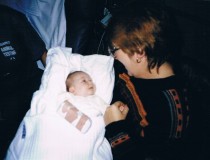
Today is International Day of People with Disability, it’s a United Nations sanctioned day that aims to promote understanding and encourage support of people with disability.
For 14-year-old Maya, having a disability will never define her, she won’t allow it to. Since she was just eight-weeks-old Maya has had T3 paralysis, meaning she has no movement from her chest down. Maya has faced many challenges in life, including the devastation of losing friends in the 2009 Black Saturday bushfires that tore through her hometown of Kinglake, the same week she was preparing for one of many major surgeries.
Despite everything, this courageous teenager has hopes and dreams for her future that don’t leave room for disability. She is positive and focused on what she can do instead of dwelling on the things she can’t.
The day after Maya was born a nurse at the hospital noticed she had swollen feet and she was sent away for tests but they all came back clear. Her parents Lucy and Peter were relieved and couldn’t wait to take their new baby girl home.
After a few weeks the Maternal and Child Health Nurse told Lucy that Maya wasn’t putting on weight and that she seemed to be a very quiet baby.
“Maya was my first baby so I didn’t know what to expect, but I was worried that she wasn’t putting on weight, and then she started to lose weight and the Maternal and Child Health Nurse advised us to take her in to the Emergency Department at The Royal Children’s Hospital (RCH),” said Lucy.
 “The doctors seemed to know something was wrong right away and they admitted her. We were seen by the neurologist as soon as we got to the ward and Maya was sent for more tests. An MRI showed she had cysts on her spinal cord, which had damaged nerves in her spinal column. I think I was still in denial at that point, in some ways the diagnosis validated our concerns but I still didn’t want to believe it was true,” she said.
“The doctors seemed to know something was wrong right away and they admitted her. We were seen by the neurologist as soon as we got to the ward and Maya was sent for more tests. An MRI showed she had cysts on her spinal cord, which had damaged nerves in her spinal column. I think I was still in denial at that point, in some ways the diagnosis validated our concerns but I still didn’t want to believe it was true,” she said.
“Maya had already lost the use of her right arm and we were told that she would be paralysed as a result of the cysts, and that she had to have neurosurgery immediately. She was only eight-weeks-old at the time,” said Lucy.
“Seeing her in recovery after that first surgery was tough. There were so many tubes and machines connected to her and she was so tiny. I think it was then that it really hit me,” she said.
Just two weeks later Maya had to go back in for a second major surgery to remove the cysts from her spinal cord because some had resurfaced after the first surgery. After that she regained the use of her left arm but the nerves in her right arm were too damaged to repair.
Ever since those first surgeries, Maya has spent much of her life in an out of the RCH. The nerve damage to her spinal cord has weakened her chest muscles, affecting her breathing and leading to numerous chest infections and long stays in intensive care. Maya also lived with a feeding tube for six years and has had three major spinal surgeries with long recoveries to correct severe scoliosis (a side spinal curve) and kyphosis (a forward spinal curve).
“Maya’s health has such a huge impact on how we function as a family, when she’s okay we are too but when she’s going through a hard time we go through it with her,” said Lucy.

“Maya’s younger siblings understand what it means to be unwell, they know hospital life all too well as they have grown up at the RCH with Maya. My twins even learnt to walk at the RCH, which happened during one of Maya’s stays in intensive care. They all have such a good insight into and understanding of what she goes through.”
“Maya amazes us every day; she is extremely strong and takes everything in her stride. She watches the news and sees other people in tough situations and she feels so much for them, but she doesn’t see herself as being different to anyone else,” she said.
Maya is focused on a bright future; she can’t wait to learn how to drive and is already planning overseas trips for when she finishes school. For now, she loves just being a teenager, enjoying her time with friends, rehearsing for the upcoming school play and going on cycling adventures with her family, something she can now do after learning hand cycling during rehabilitation at the RCH.
 Her independence has grown significantly since becoming involved in rehabilitation programs – a private program called ‘Walk On’ and the more widely available Victorian Paediatric Rehabilitation Service. Lucy and Peter are constantly amazed by their eldest daughter, who they say is the director of the family
Her independence has grown significantly since becoming involved in rehabilitation programs – a private program called ‘Walk On’ and the more widely available Victorian Paediatric Rehabilitation Service. Lucy and Peter are constantly amazed by their eldest daughter, who they say is the director of the family
“We always wanted to make sure Maya felt accepted and it means everything to know that she doesn’t see herself as having a disability, she doesn’t want it to define her. She’s just Maya and we couldn’t be prouder of her.”



